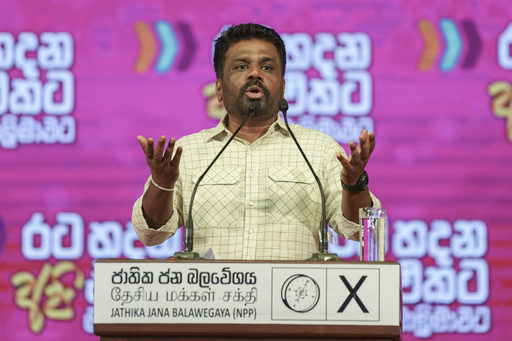
COLOMBO, Sri Lanka — The upcoming parliamentary election on Thursday is crucial for Sri Lankan President Anura Kumara Dissanayake, who aims to bolster his party’s influence in order to fulfill his campaign promises related to addressing economic challenges and improving governance.
Dissanayake, who secured the presidency on September 21, represents a shift away from the traditional political establishments that have dominated Sri Lanka since it gained independence in 1948. However, his failure to garner more than 50% of the votes has raised questions about his party’s prospects in the upcoming parliamentary elections. His National People’s Power party needs to significantly enhance its support—up from the 42% it received during the presidential polls—to achieve at least 113 seats in the 225-member Parliament, allowing it to establish control.
In his campaigning efforts, Dissanayake has urged voters to support his party’s candidates, emphasizing the importance of a stable government devoid of coalition dependencies to implement the reforms he has proposed. “To rebuild the country, we need a strong and steadfast government in Parliament. It is essential for our party members to occupy these seats,” he stated enthusiastically during a rally on the last day of campaigning.
The context of this election is significant, as Sri Lanka is recovering from its most severe economic crisis, having declared bankruptcy after defaulting on its external debts last year. The nation is currently engaged in a bailout program with the International Monetary Fund (IMF), with nearly completed debt restructuring efforts involving international creditors.
While initially indicating plans to alter the IMF agreement signed by his predecessor, Dissanayake has recently maintained that Sri Lanka will adhere to the terms set forth and will not seek modifications. He announced to his supporters that a team from the IMF is scheduled to arrive two days post-election for a comprehensive review.
“By January’s end or early February, we expect to finalize this venture. By that time, we will have made significant strides toward economic stability,” he noted. The government plans to unveil its inaugural budget next February, which is anticipated to include proposals aimed at reducing taxes and enhancing salaries for government employees.
Political analyst Jehan Perera remarked that Dissanayake has taken a cautious approach, largely maintaining his predecessor’s policies. He has been attentive to the business community’s concerns, aware that straying from the IMF agreement could jeopardize economic recovery.
“Sri Lanka’s recent troubles stemmed from a mix of poor economic management and the impact of the pandemic, which severely affected the critical tourism sector following attacks in 2019. Additionally, the pandemic significantly disrupted remittances from Sri Lankans working overseas,” Perera explained.
The government also enacted significant tax cuts in 2019, which drained treasury resources just as the pandemic struck. A dramatic drop in foreign exchange reserves rendered Sri Lanka unable to afford imports or sustain its currency, the rupee.
The economic turmoil gave rise to a political crisis, ultimately leading to the resignation of former-President Gotabaya Rajapaksa in 2022 and the subsequent election of Ranil Wickremesinghe as his successor. Throughout Wickremesinghe’s administration, the economy stabilized, inflation rates decreased, the local currency strengthened, and foreign reserves saw an uptick. Nevertheless, he lost favor among the public due to increased electricity rates and new tax policies introduced as part of meeting IMF requirements.
Dissanayake’s National People’s Power party has gained traction since his election victory, while opposition factions remain fragmented. “Those reassured by the smooth transition of power and the NPP’s measured approach in its initial months are likely to support him. This number could surpass the percentage that voted for him in the presidential elections,” Perera added.
A laborer named Ruwan Sanjeewa, 36, attended one of Dissanayake’s final rallies in Gampaha, situated 34 kilometers (21 miles) north of Colombo. He expressed his intention to vote for the NPP, stating, “Look at the current state of our country. The longstanding political parties that have governed for decades have consistently failed to fulfill their promises. We find ourselves in dire straits. Therefore, I believe it is time to give the NPP a chance. I am hopeful they can improve things here.”
